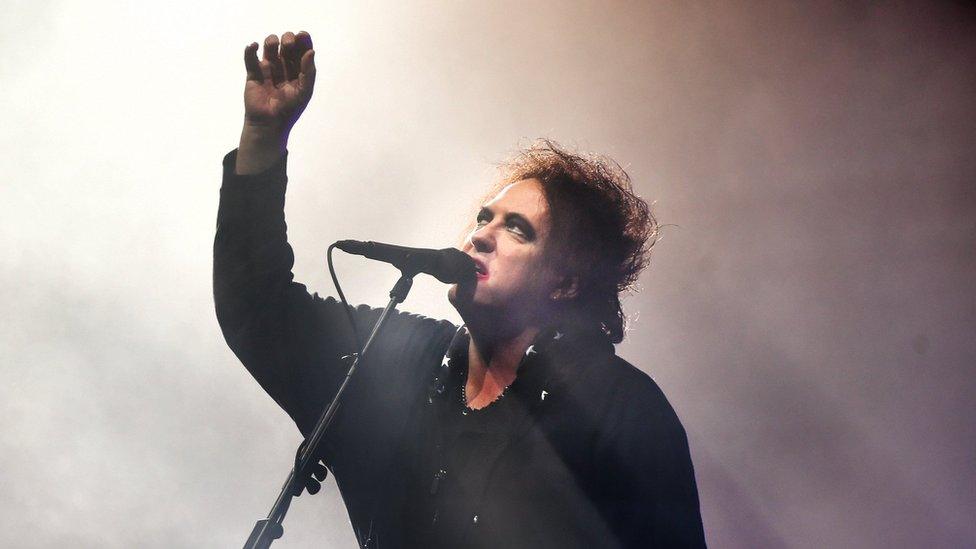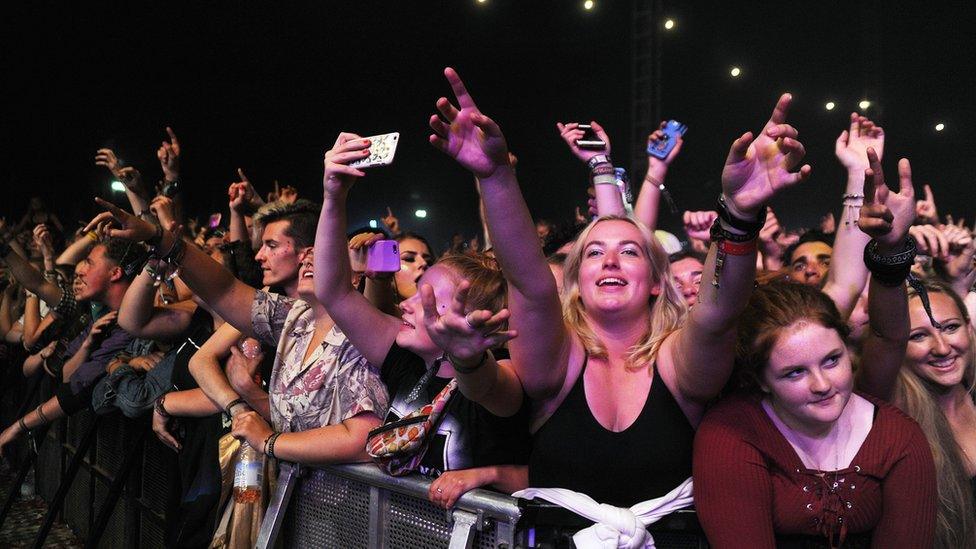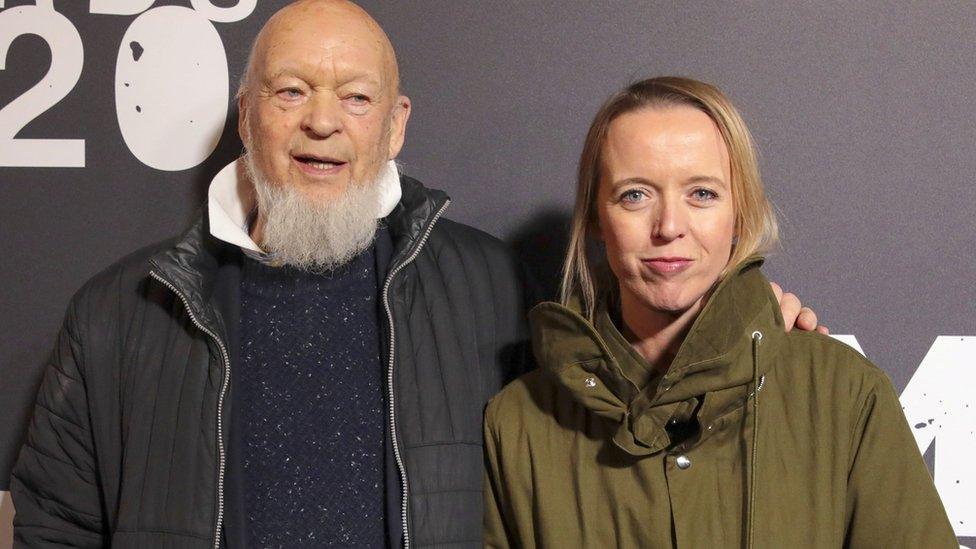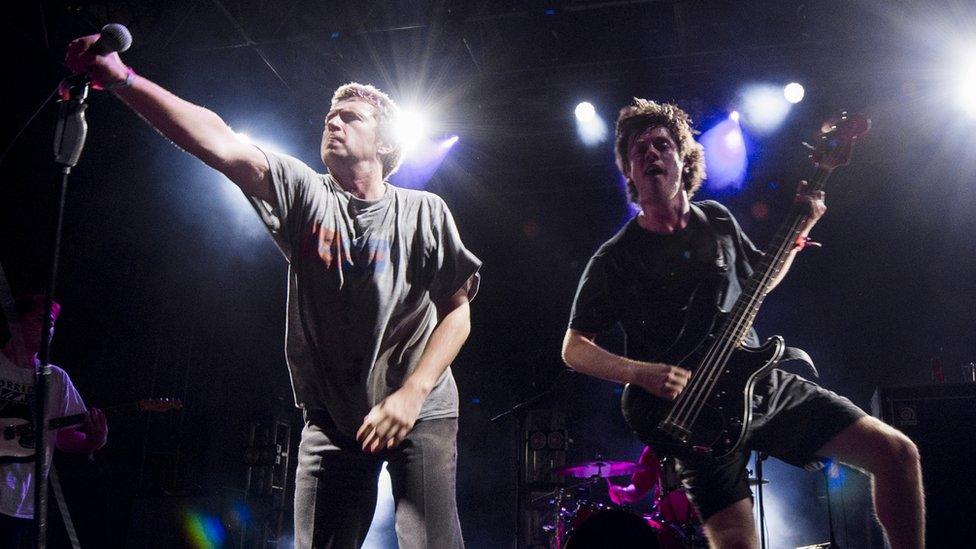Music festivals could be cancelled this month, MPs told
- Published
- comments

The Cure were the last band to headline Glastonbury's Pyramid Stage in 2019 - with last year's festival called off
Some of the UK's biggest music festivals could be called off by the end of this month, MPs have been told.
Events are "rapidly approaching the determination point", after which they'll have to pull the plug, said the Association of Independent Festivals.
Organisers will be in "absolutely dire straits" financially if the season is cancelled, added Anna Wade, of Winchester's Boomtown Fair.
They were speaking to MPs examining the plight of music festivals in the UK.
The House of Commons culture select committee is carrying out an inquiry into the viability of this summer's events, external, after the coronavirus pandemic wiped out the 2020 festival season.
Tuesday's hearing came a day after Glastonbury festival organiser Emily Eavis assured fans, external they "haven't cancelled" the 2021 event.
'Festivals are going to drop away'
But the committee was told that the government needs to introduce Covid cancellation insurance for live events and an extension to the current VAT cut on concert tickets.
"If the government don't help with insurance, then the smaller festivals are going to drop away," said Sacha Lord, co-founder of Manchester's Parklife Festival.
He added that vaccinations and mass testing were essential to ensure the future of live music.
"Social distancing does not work at any of these events," he told MPs. "It's a festival. You just cannot put social distancing in place, so we are anticipating that we will be operating at 100% [capacity]."
Wade pointed out that rapid-turnaround testing would place another financial burden on festival organisers. Testing kits are currently £10 each, she said, potentially meaning an outlay of £660,000 for her 66,000 attendees.
However, Lord, who is also night-time economy adviser for Greater Manchester, said he was optimistic that festivals would "bounce back" once the virus was under control.
"People want to go to a gig, whether it's a festival or a small grassroots venue," he said. "The appetite is out there."
Steve Heap, general secretary of the Association of Festival Organisers, said that while major festivals would have to make a decision this month, smaller events had until April.
"If we get as far as Easter and we still don't know that crowds can gather at festivals, however large or small, then we are in a catastrophic situation with this year's season," he said.
'No certainty'
The UK live music industry was worth £1.3bn in 2019 - but it has been hit hard by the pandemic, with more than 90% of the gigs planned for 2020 cancelled.
Before Tuesday's hearing, music industry trade body UK Music called on MPs to name a "restart date" after which gigs can go ahead.

The lack of coronavirus insurance was the "biggest barrier" to events resuming, it said, pointing out that Germany had recently announced a £2.3bn event cancellation fund, in line with several other European countries.
Such a situation puts the UK at a "competitive disadvantage", UK Music's chief executive Jamie Njoku-Goodwin warned.
"The real danger here is that, if we see a lot of countries - particularly in Europe and closer to home - protecting their festival seasons, you could almost have a talent transfer," he told the committee.
"We don't want to have a situation where musicians, crews, technicians - people who should be working in the UK festival scene - are looking to the continent and thinking, actually, if there's going to be live music happening there in 2021, that's where we're going to be going."
UK Music's call to action came in a report called Let the Music Play: Save Our Summer 2021, which outlined a range of measures that could help the industry get back up and running.
In a statement, Mr Njoku-Goodwin said that even with the roll-out of vaccines, "lack of notice and available insurance options will mean much of the 2021 summer music season can't go ahead".
Responding to the report, a spokesperson for the Department for Digital, Culture, Media and Sport said: "We know these are challenging times for the live events sector and are working flat out to support it.
"Our £1.57bn Culture Recovery Fund has already seen more than £1bn offered to arts, heritage and performance organisations to support them through the impact of the pandemic, protecting tens of thousands of creative jobs across the UK, including festivals such as Deer Shed Festival, End of the Road and Nozstock."

Follow us on Facebook, external, or on Twitter @BBCNewsEnts, external. If you have a story suggestion email entertainment.news@bbc.co.uk, external.
Related topics
- Published29 December 2020

- Published16 December 2020

- Published30 December 2020
